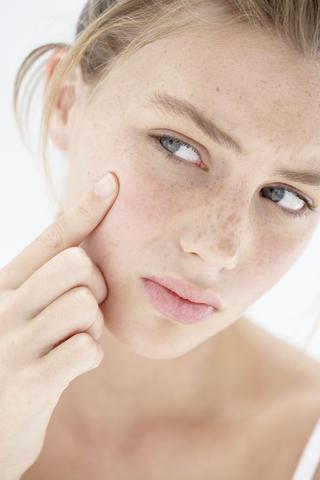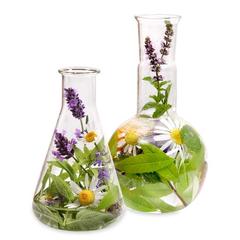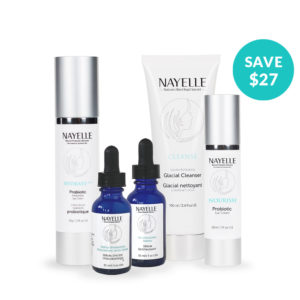
Having a sensitive skin type can mean different things to different people. It can be caused by skin conditions such as rosacea, eczema or allergies. Sensitive skin can become inflamed and irritated easily. It is important to choose the right skin care for sensitive skin because many cleansers and moisturisers contain ingredients that can cause an adverse reaction.
Many people say they have sensitive skin because skin care products, or household products that contact their skin, cause stinging, burning, redness, or tightness. Or they say they have it because even though they have no visible effects after contact with a product, it always makes their skin feel uncomfortable.
HOW TO IDENTIFY
- Tends to feel tight
- Usually very dry
- Becomes inflamed and irritated easily
- Sensitive skin develops reddish and scaly areas
- Itchy and tingly
- Prone to breaking into spots
- Most problematic and fragile type of skin
What causes sensitive skin reactions?
- Skin disorders or allergic skin reactions such as eczema, rosacea, or allergic contact dermatitis
- Overly dry or injured skin that can no longer protect nerve endings, leading to skin reactions
- Excessive exposure to skin-damaging environmental factors such as sun and wind or excessive heat or cold
- Genetic factors, age, gender, and race differences in skin sensitivity are less well-defined but still may play a role in causing skin reactions.
What types of cosmetics are less irritating to sensitive skin?
If you have sensitive skin, the American Academy of Dermatology recommends the following:
- Use face powder, which has few preservatives and minimal risk of skin irritation.
- Use a silicone-based foundation for minimal skin irritation.
- Do not use waterproof cosmetics; you need a special cleanser to remove them.
- Use black eyeliner and mascara; they appear to be least allergenic.
- Use pencil eyeliner and eyebrow fillers; liquid eyeliners may contain latex and may cause an allergic reaction.
- Throw out old cosmetics; they can spoil or become contaminated.
CARING FOR SENSITIVE SKIN
-
Avoid Problem Ingredients
Find what products or ingredients are causing the problem and stop using them.
Sometimes this is a simple determination. If you started using a new concealer and within a few hours that area became red, itchy, and swollen, it is clear that the concealer is the problem. Unfortunately, it isn’t always that easy. What makes this process potentially difficult is that many skin reactions don’t happen quickly. It may be several weeks or even months or years after you’ve been using a product before your skin has a negative reaction to it. Further, given the number of cosmetic products women use daily, it is no wonder that pinning down exactly which item caused the problem can be a challenge.
To make matters even more complicated, it may not be a single product but the combination of products that caused the problem, maybe the concealer isn’t the problem, but the concealer, foundation, and moisturizer together that caused the reaction. The key here is patience and diligence. Experiment with the item or items you suspect and then see how your skin responds when you discontinue use.
AVOID THE FOLLOWING
- Overly abrasive scrubs (such as those that contain aluminum oxide crystals, walnut shells, or pumice)
- Astringents containing irritating ingredients (alcohol and menthol being the prime offenders)

- Toners containing irritating ingredients (alcohol and menthol being the prime offenders)
- Scrub mitts
- Facial masks containing irritating ingredients (watch out for fragrant essential oils and polyvinyl alcohol)
- Cold or hot water
- Steaming or icing the skin
- Loofahs
- Bar soaps and bar cleansers
- Also, please consult our Cosmetic Ingredient Dictionary for a list of irritating ingredients to watch out for when shopping for skin-care products.
AVOID OTHER IRRITANTS
- While you are combating the allergic or sensitizing reaction do not use any other skin irritants of any kind over the affected area. Fragrances, scrubs, washcloths, AHAs, Retin-A, Renova, benzoyl peroxide, skin lighteners, or other skincare products with active ingredients can trigger irritation and only add to the problem. Avoid saunas, steam, hot or cold water, sweating (think cooking over a hot stove), or rubbing the affected area, all of which can help re-trigger the reaction.
Here are some surprising facts on why irritation is so bad for your skin, whether it is sensitive or not:
- Chronic, daily irritation steadily breaks down substances (such as collagen) your skin needs to stay smooth, firm, and healthy.
- Irritation impairs skin’s ability to heal and hold on to vital substances it needs to look and act younger.
- For those with oily skin, using irritating ingredients stimulates nerve endings at the base of the pore that, you guessed it, trigger more oil production!
- Whether you see the effects of irritation or not, it can be silently and invisibly happening beneath your skin. You’ll see its effects years later in the form of uneven skin tone, enlarged pores, and general “problem” skin.
- Using irritating ingredients can cause otherwise normal, healthy skin to become sensitive and unusually reactive.
Best tip is to use all natural or organic products because it doesn’t contain any harmful ingredients. Organic products are the best supplements for our skin since it provides wholistic benefits. Perfect example is NAYELLE’s cosmetic line as you will be provided with plenty of options from masks to creams which is ALL NATURAL. There is no other beauty than natural beauty.

